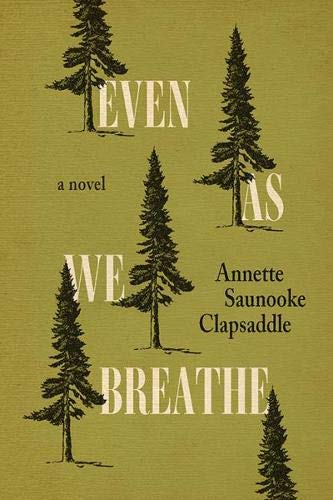Even As We Breathe
Clapsaddle’s debut, the first novel by an enrolled member of the Eastern Band of Cherokee Indians, is an impressive work of literary historical fiction. Her protagonist’s journey of first love and coming-of-age is embedded in an Appalachian setting that feels both mysterious and tangibly real. She also pens a moving ode to the many conduits of human history – people’s memories, writings, bones, the very ground under our feet – and how we learn what they teach us.
In 1942, nineteen-year-old Cowney Sequoyah, eager to escape his overbearing uncle and his home on the Cherokee reservation in the Smoky Mountains, takes a job with the grounds crew at the Grove Park Inn in Asheville, two hours away. Accompanying him on the drive is Essie Stamper, a young woman whose beauty, sophistication, and self-confidence unsettle him.
Born with a twisted foot, Cowney is ineligible for military service, but he gets entangled in wartime intrigue, nonetheless. The inn is being used by the U.S. Army to house high-ranking POWs, including foreign envoys and their families. While Cowney’s immediate supervisor treats him well, others on site exhibit racist attitudes towards Indians. He and Essie become good friends and frequently meet in an unoccupied hotel room to talk and play dominos, but Essie is keeping a secret from him, and the disappearance of a Japanese diplomat’s daughter threatens to destroy his freedom. As Cowney struggles to prove his good name, he gradually learns the truth about his late father’s death in WWI.
Through Cowney, Clapsaddle presents warm, lyrical observations of Cherokee family life and traditions, such as the comfort of his grandmother Lishie’s quilts and the holiness of “ladies in boldly colored headscarves [who] sang ‘Amazing Grace’ in our language.” The concluding message about the characters’ ties to their homeland is also beautifully affecting.










